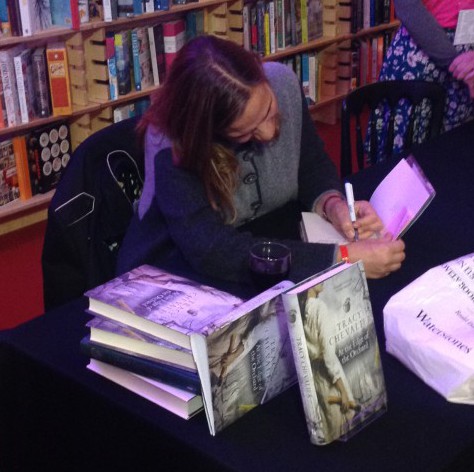Inspiring Older Readers
 posted on 18 Oct 2016
posted on 18 Oct 2016
At the 2016 Cheltenham Literary Festival : Part Two
Having a full time job makes getting to events during the week difficult and so when the programme for the festival comes out I usually go directly to look at what’s on over the weekends and maybe the Friday evenings. Although this can sometimes result in real frustrations when I have to forego something I would have loved to see, this year I was fortunate because I didn’t feel I’d missed anything great in the space between the two weekends. In fact, I think that in general terms the festival was a bit light this year on real show-stoppers in terms of literary big-hitters. There were, for my taste, way too many celebrity or personality books being promoted and a real mountain of events about great authors rather than great writers themselves.
On Friday evening we rolled up to the Inkpot tent – the most intimate of all the festival venues I think – to hear Tracey Chevalier talking about her latest book, At the Edge of the Orchard. I’m used to being part of the generally white, elderly demographic that seems to dominate most of the audience at literary festival events but on this occasion I was also struck by the massive gender imbalance in this particular gathering – Tracey Chevalier is clearly seen by the reading public as a ‘woman’s’ writer.
What she had to say about her book, and especially the research that went into it, was fascinating and when it came to reading a section, she was quite spellbinding. Chevalier has a superb reading style and her muted American accent gave the voices of characters a real authenticity it would be hard to instil using a British inflection. When the discussion broadened to her other novels and her forthcoming work she was informative, open and engaging.
Each year the Festival confers on a big name author the accolade of a prize for literary excellence – whatever that means. This year that award went to Karl Ove Knausgaard and we went along on Sunday late afternoon to hear what he had to say. I have to say the ‘award’ element is slightly overblown in that it doesn’t involve the presentation of a plaque or trophy of some sort but instead the author is given something that looks like a beautifully wrapped present that they are expected to unwrap on stage like an over-excited child on Christmas morning. It’s a rather uncomfortable and awkward thing to witness although thankfully on this occasion Knausgaard carried it off well enough.
Knausgaard speaks pretty good English and has that sort of rugged good looks, charm and diffidence that somehow imbues so many Scandinavians with a sense of depth and gravitas – almost regardless of what they have to say. He was, however, genuinely interesting in the way he talked about the, as yet unfinished, project of his fictionalised autobiography, My Struggle. Mark Lawson who was interviewing did a good job of gently probing at some of the potential contradictions in the writing process and focussed on what most people want to know – what is the balance between truth and fiction and is the ‘fiction’ really fiction or false memory. The author’s own take on this was that given there is no narrative direction in the books the point is almost exclusively to set out his truth even if that involves detail that others disagree with or never themselves witnessed.
As to whether Knausgaard really deserves the prize for literary excellence or not is open to debate. He is the first writer in translation to get the award and only the third from overseas – which suggests that he has produced a formidable body of work. He does, however, split opinion amongst readers because there are those who are extravagantly impressed by each new publication – and there is only one final instalment of the sequence left to come out next year - and there are those who think it is self-indulgent and a symptom of the dominant ‘me’ generation that obsesses about the self over everything else.
I think it might be too early to judge. Knausgaard is working on a number of shorter books which see him taking a different direction and I think it will be interesting to see whether he fulfils expectations with these or whether he falls short of the sort of greatness suggested by this award.
With festival now over for another year all that’s left to do is look forward to the next.
Terry Potter
October 2016
